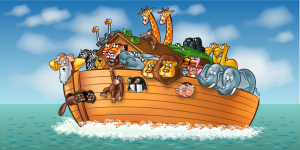 I recently took part in a Tansley working group, an initiative that has a main working theme of advancing the ecological foundations of sustainability science. In this specific case we are seeking to construct a unified framework to help understand the multidimensional stability of ecosystems.
I recently took part in a Tansley working group, an initiative that has a main working theme of advancing the ecological foundations of sustainability science. In this specific case we are seeking to construct a unified framework to help understand the multidimensional stability of ecosystems.
In an era of increased human activity, significant climate change and biodiversity loss, an understanding of the mechanisms and drivers of ecosystem stability has vast implications for both ecological theory and the management of natural resources.
One large challenge in the study of ecological stability comes from the complexity of ecosystems. The dynamics of an ecosystem depend not only on the network structure, the interactions among different species, but also on external perturbations that vary in context, intensity and frequency.
Another huge challenge is the multidimensional nature of ecological stability, with its many measures and definitions including resistance, resilience and temporal variation, all of which are themselves interrelated. Stuart Pimm, a member of the Tansley working group, reviewed four measures of stability in one of his early publications in Science (Pimm, 1984) and one blog from Jeremy Fox even summarized 20 different stability concepts!
Both theoretical and empirical ecologists have spent decades exploring the role of community structure, interaction strength and disturbance in determining the dynamics and stability of ecosystems. However, most of these studies only focused on a single aspect of ecological stability, underestimating the impacts and recoveries of populations and communities.
Failure to consider the multidimensionality of stability is magnified when the relationships among these stability elements are quite fragile. For example, one lake or reservoir may maintain its stability in total biomass following a disturbance by adjusting its nutrient load, but the community composition has changed dramatically.
To create a unified concept of stability across theoretical, field-based and experimental research the confusion in using and defining these different elements of stability must be cleared up.
A typical confusion arises from the usage of the term resilience, which can be defined as the recovery time or speed following a disturbance to a pre-disturbed state; for instance the time taken for an area of scrubland to recover from a wild fire. The method used to calculate resilience in the local stability of theoretical communities is impossible to detect in the real world. So there is an urgent need to fill this gap by making a framework that suits both empirical scientists and theory development.
And that is one of the main challenges the Tansley working group seeks to face. We aim to construct a framework of ecological stability across major global ecosystems through a review of the most up to date measures of ecological stability (both empirical and theoretical) using specific case studies. This will help researchers adopt a more comprehensive approach to investigate stability and facilitate the comparison across different systems and scales in the future. We will also evaluate the feasibility in applying theoretical stability measurements to real ecosystems and abandon those which will are next to impossible to obtain from the real world.
To communicate the importance of the stability concept to a much broader audience, we will provide videos as well as vivid examples to illustrate the concepts of the different stability elements and how to measure them. We have an enthusiastic belief that the Tansley group will make a big contribution to the standardization of concepts and measurement of the multidimensional stability.
Author: Marvin Qiang, qyang@tcd.ie, @MarvinQiangYang
Photo credit: http://www.changedbygrace.net/2012/09/21/faith-floods-and-finances/





